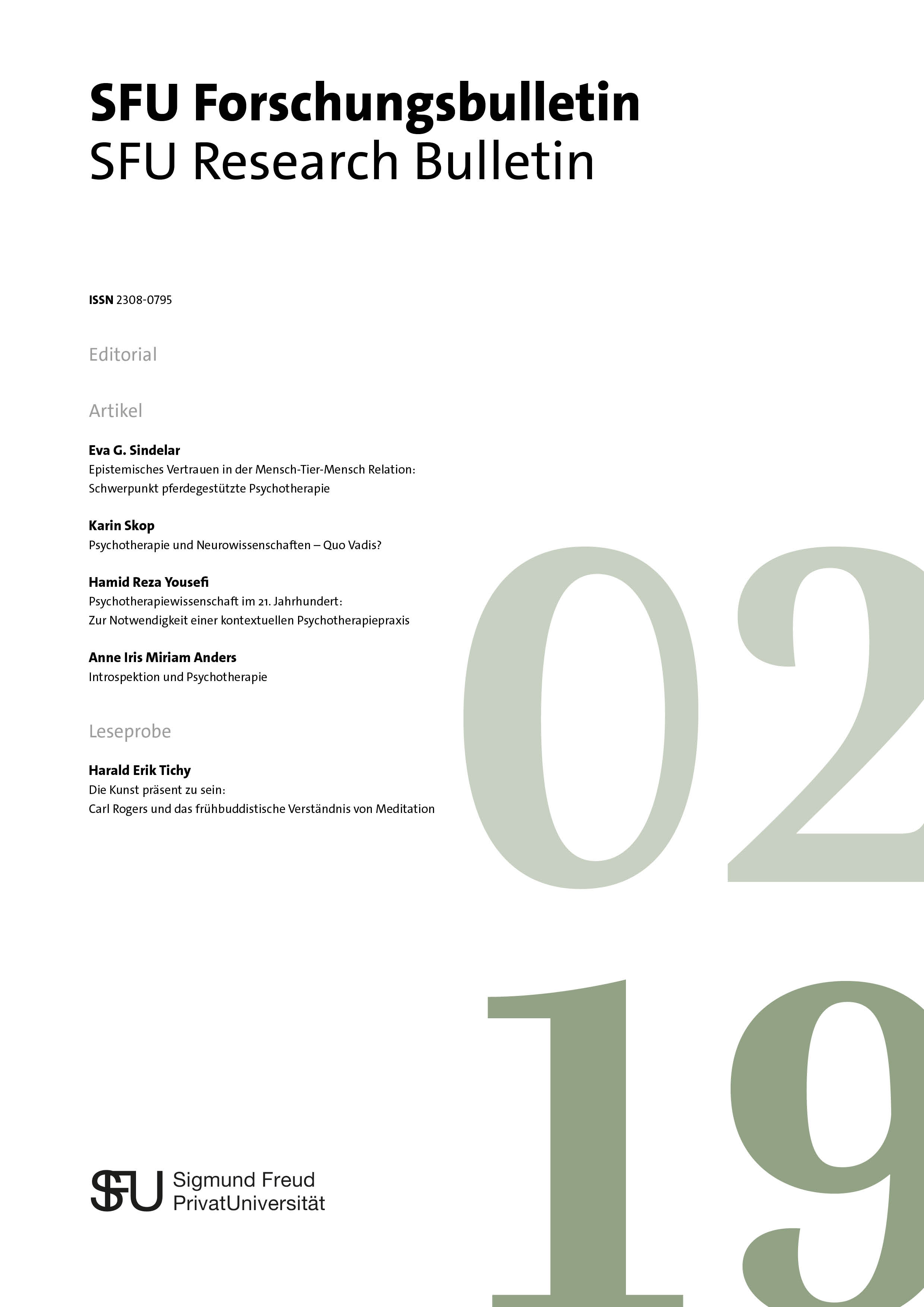Introspection and Psychotherapy
DOI:
https://doi.org/10.15135/2019.7.2.55-70Abstract
Introspection forms the basis for developing the therapeutic relationship and impacts on psychotherapy processes and outcomes. The acquisition of introspective methods requires a thorough understanding of their crucial elements and applied learning processes based thereon. By a transcultural approach, essential training techniques that are used beyond Buddhist philosophical schools and traditions were taught to psychotherapists, psychotherapy patients and students. Their development of self-reference, emotion regulation and empathy was investigated on this basis. Whereas the specification of gradual learning processes facilitated to go beyond stereotypes and superimpositions occurring in buddhist meditation contexts, the use of qualitative methods enabled for an analysis of the idioms employed by the subjects for the corresponding internal processes. The categorization of these results as training techniques, essential aspects, transient experiences, effects or integration allows for approaching the determinants of introspective learning processes, the quantification of specific factors and theory forming. Not only do these findings provide implications for psychotherapists and their patients within clinical settings, but also for psychotherapy education and research.
References
Attersee, A. I. M. (2014). Kognition und Emotion in der Tibetischen Medizin Eine Darstellung und Interpretation aus emischer Perspektive. Aachen: Shaker. http://www.shaker.de/de/content/catalogue/index.asp?lang=de&ID=8&ISBN=978-3-8440-3254-3
Attersee Anders, A. I. M. (2016). Selbstreferenz Ein dynamisches Selbstreferenzmodell auf der Grundlage von graduellem kognitivem Training. Wiesbaden: Springer. http://www.springer.com/de/book/9783658117085#
Attersee Anders, A. I. M. (2017). Introspektion als Wirkfaktor in der Psychotherapie. Eine Modellbildung zu den Effektstrukturen des in Buddhismus und tibetischer Medizin überlieferten Graduellen Kognitiven Trainings und seine Implikationen für die Psychotherapiewissenschaft. Wiesbaden: Springer. http://www.springerprofessional.de/en/introspektion-als-wirkfaktor-in-der-psychotherapie/12220862
Barwinski, R. (2014). Die therapeutische Beziehung. Psychotherapie-Wissenschaft, 1, 2-3.
Coleman, G. and Jinpa, T. (Ed.) (2008). Das Tibetische Totenbuch. Die Große Befreiung durch Hören in den Zwischenzuständen. München: Arkana.
Evans-Wentz, W. Y. (Ed.) & K. Dawa-Samdup (Transl). (1953). Das tibetanische Totenbuch oder die Nach-Tod-Erfahrungen auf der Bardo-Stufe. Zürich: Rascher & Cie. AG.
Jung, C. G. (1953). Psychologischer Kommentar zum Bardo Thödol. In: W.Y. Evans-Wentz (Ed.) & K. Dawa-Samdup (Transl.), Das Tibetanische Totenbuch oder Die Nach-Tod-Erfahrungen auf der Bardo-Stufe (pg. LVII-LXXIII). Zürich: Rascher & Cie. AG.
Kohut, H. (1977). Introspektion, Empathie und Psychoanalyse Aufsätze zur psychoanalytischen Theorie, zur Pädagogik und Forschung und zur Psychologie der Kunst. Frankfurt a. M.: Suhrkamp.
Krampen, G. (2006a). ASS-SYM. Änderungssensitive Symptomliste zu Entspannungserleben, Wohlbefinden, Beschwerden- und Problembelastungen. Manual. Göttingen: Hogrefe.
Krampen, G. (2006b). ASS-SYM Symptomfragebogen. Göttingen: Hogrefe.
Madert, K. K. (2007). Trauma und Spiritualität. Wie Heilung gelingt. Neuropsychotherapie und die transpersonale Dimension. München: Kösel.
Mertens, W. (2008). Introspektion. In W. Mertens & B. Waldvogel (Ed.), Handbuch psychoanalytischer Grundbegriffe (pp. 369-374). Stuttgart: W. Kohlhammer GmbH.
Mertens, W. and Waldvogel, B. (Ed.) (2008). Handbuch psychoanalytischer Grundbegriffe. Stuttgart: W. Kohlhammer GmbH.
Tsepak, R. (2003). Tibetan-English Dictionary of Buddhist Terminology. Dharamsala: Library of Tibetan Works and Archives.
Williams, J. M. G. (2010). Mindfulness and Psychological Process. Emotion, Vol. 10, No. 1, 1-7. doi: 10.1037/a0018360.
Downloads
Published
Issue
Section
License
The reproduction of articles published in any form is allowed under the condition that the citation is comprehensive. Prints in other publication media or public media require the written consent of the editor and can be requested under: forschung@sfu.ac.at
